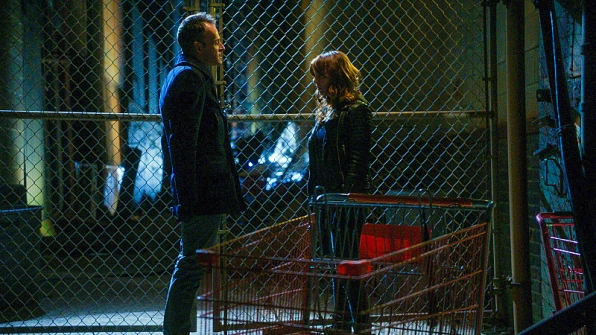I keep thinking about last night’s Elementary, “The One That Got Away.”
In the third season of Elementary, Sherlock Holmes took on a new partner, Kitty Winter, while Watson struck out on her own as a private investigator. So as not to break the format too much, Holmes and Watson both consulted with the NYPD, often on the same cases, so the show still functioned basically as it had before, but now there was a new element in the mix, a young English woman (Kitty) with a tragic and violent backstory (she was kidnapped and, over the span of a month, brutally and repeatedly tortured and raped until she was able to escape).
Two weeks ago, a woman’s body was found in New York, tortured and branded the same as Kitty had been during her captivity some five years prior. Last week, Holmes, Watson, Winter, and the NYPD hunted down the perpetrator, and Winter went to extreme lengths to find the man who had hurt her. At the end, their main suspect died in a boat fire. But — shock twist — the perpetrator was not, in fact, the man they had been pursuing. It was, in fact, Del Gruner, the head of a major insurance firm and Joan Watson’s new boss.
Last night, then, was the pursuit of Gruner. Fans of the Canon will recognize these names; Kitty Winter and Aldelbert Gruner come from “The Adventure of the Illustrious Client,” and even though I knew how that story ends, I didn’t know if Elementary would go that route. When there was no “murderous attack on Sherlock Holmes” (one of the great lines from the Canon, to be honest), I felt confident that Elementary was going its own path.
If you know “The Illustrious Client” (and I’m not spoiling the ending of that here), it ends in a very dark place. “The One That Got Away” actually manages to go to a vastly darker place. The scene where Kitty is preparing the nutmeg concoction was chilling; she was -far- beyond premeditation. She had gone to cold and calculating fury. It was scary. It was also understandable. Ophelia Lovibond’s performance as Kitty was utterly sympathetic, and Buzzfeed has a really good article about what the producers and Lovibond were going for and achieved last night.
My thoughts keep returning to the three present-day scenes between Jonny Lee Miller (as Holmes) and Lovibond (as Winter). (The episode is told partly in flashback, showing us their first meeting after the second season finale and their early interactions.) Winter brought out a facet to Holmes that no other Holmes story (except, maybe, for the first of the Mary Russell novels) has had — Holmes as the paternal figure. Holmes and Winter weren’t related, but they read like a family. He was the father who had been through hell and still struggled with his demons. She was the daughter who needed to prove herself yet still wanted his validation and approval. Something as simple as Holmes scrambling eggs for Winter’s breakfast carried great emotional freight. Later, paraphrasing from memory — “You will always be special to me. Whatever you do, you will always be my friend.” — spoke powerfully to the bond between the two characters; whatever choice she made, it had to be hers, and Holmes would love her irregardless. And Winter’s final line in the episode, though it didn’t need to be said, because her actions with Gruner said it well enough, was earned and cathartic.
I also keep thinking of this episode in terms of Sherlock and whether it would have worked with those versions of Sherlock Holmes and John Watson. If it were Molly in Kitty’s position, would those three Holmes/Winter scenes have occurred with Sherlock/Molly? I can’t imagine them. I can’t imagine the Sherlock of Sherlock as being as open emotionally to another human being as the Sherlock of Elementary was to Kitty. Neither version of Holmes is particularly healthy emotionally, but the Sherlock of Elementary has more self-awareness of his failings. Sherlock‘s Sherlock would’ve been petulant that Molly reached Gruner before he did, and based on “His Last Vow” he would have taken the agency from Molly that Elementary‘s Sherlock allowed Kitty by taking matters into his own hands. The two shows and their approaches to Sherlock Holmes are fundamentally different and valid in their own ways, but I think Elementary remembers that there’s a human being inside of Sherlock Holmes that Sherlock sometimes forgets.
Suffice it to say, last night’s Elementary was impressive. It had to be; I keep thinking about it. I’m not sure where Elementary goes from here.
